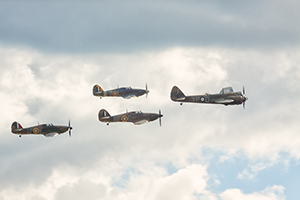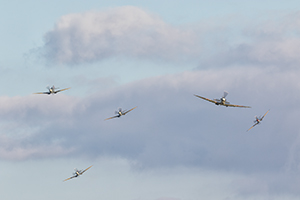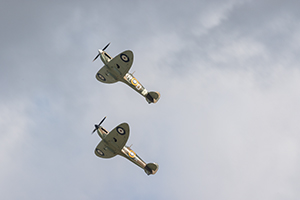| Duxford
Battle of Britain Airshow 2015
|
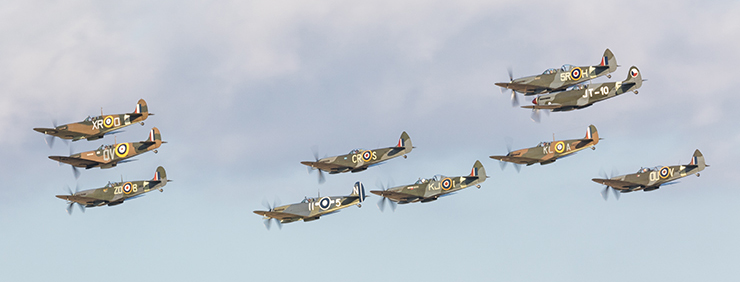 |
|||
| During the early stages of the Second World War, the Nazi War Machine had swept through Europe carrying out Hitler’s Blitzkrieg. By summer 1940 the British Expeditionary Force had been evacuated from the Beaches of Dunkirk and the people of the United Kingdom prepared for the invasion of British Isles in the form of Operation Sea Lion. All that stood between the start of this invasion was control of the skies over the UK and the planned elimination of the RAF. With the Luftwaffe outnumbering RAF Fighter Command’s 640 Aircraft with a force of 2,600War Ready Air Frames, approximately a 1000 of which were Fighter Aircraft, the stage was set for what was to become “Britain’s Finest Hour”. |
|||
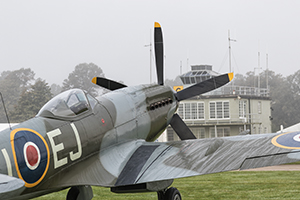 |
 |
||
On the 19th and 20th September of this year the ever popular Duxford Air Show commemorated the 75th Anniversary of the Battle of Britain, one of the most decisive points in British, if not World history. From
the line up of classic air craft on the flight it was clear
that the visitors to the ticket only, sold out eventwere in
for a treat, with the promise that the gloriousblue skies of
Duxford would be filled with some beautiful aircraft unique
formations and highly skilled flying displays. |
|||
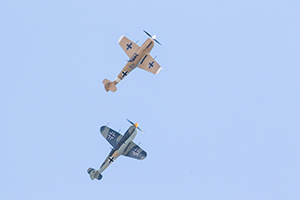 |
|
||
| The flying element of the show started with a simulated air field raid by a pair of Hispano HA-1112 Buchons representing Messerschmitt BF 109-E’s accompanied by a lone Nord 1002 representing a Messerschmitt BF 108 owned by the Aircraft Restoration Company. The aircraft dived in to perform a low level strafing pass whilst the sounds of alarm bells rang out and pilots in period dress ran for their fighters to get airborne and repel the would be aggressors. Seeing this evocative re-enactment in the flesh so to speak was quite a poignant reminder of what these young men were up against all those years ago. This part of the flying schedule continued with the scramble of the Imperial War Museums mk1a Spitfire and a Hawker Hurricane mk1 owned by the Minmere Farm Partnership (Itself a Battle of Britain Veteran with 5 recorded ‘Kills’) set to intercept the trio of Luftwaffe aircraft,, which played out into some graceful flying from the pilots with a gentle tail chase between the BF 108 and Hurricane. |
|||
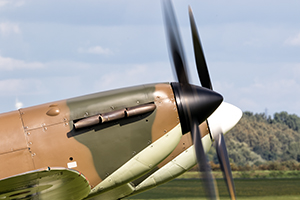 |
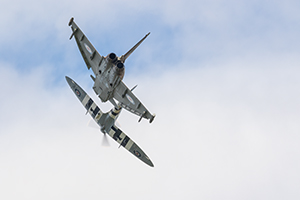 |
||
| As the flying schedule continued we were treated to a beautiful and rare flying display from a 3 ship formation of Hawker Hurricanes accompanied by the Aircraft Restoration Company’s Bristol Blenheim MK 1F all in close formation. The Blenheim coming to the end of its first season after a lengthy rebuild has become an instant hit and firm favourite across the air show scene. Later along the course of the show came a special tribute to the contribution made from the 9 American Volunteer Pilots who fought in the Battle of Britain. Two F-15e Strike Eagles flew from RAF Lakenheath in Suffolk to pair up with two Mk 1a Spitfires to perform a flypast along the length of the air field. A spectacular and extremely rare site to behold, although a second pass along the flight line at lower level in a tighter formation would have been greater spectacle perhaps. |
|||
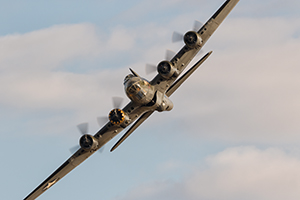 |
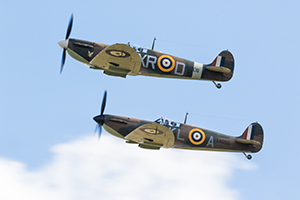 |
||
| Another rare highlight not often seen on the UK air show circuit was the entirety of the RAF’s BBMF serviceable fighters airborne together, displaying their Spitfires Mk IIa, Mk Vb, Mk IXe and XVIe along with both their Hurricane Mk IIc’s. The Flight performed beautifully to the crowd giving a tight display with some lovely top side passes. As
the show edged closer to the end of the flying the display the
B-17 Preservation trust taxied their much cherished B-17G Flying
Fortress, Sally B, out to the tarmac runway preparing to display
as part of the shows ‘Counting the Cost’ element
of the flying programme, aiming to identify the human cost behind
war. ‘Sally B’ completed her display with a flypast
in usual fashion, with smoke canisters on, trailing smoke from
the wing to acknowledge all those airmen who gave the ultimate
sacrifice throughout the war. |
|||
|
|
|
||
| Today Duxford is part of the Imperial War Museum’s fantastic Museum collection, offering a view back in time at what was a key airfield during the Battle of Britain.During the height of the Battle some 60 Spitfire and Hurricanes were scrambled and dispersed around Duxford, so it was only apt that one of the key commemorative displays arranged by IWM Duxford was the massed fly past and display of 17 Spitfire and Seafires in various marks. A gaggle of Supermarine’s finest, powering through the skies withthe Orchestral sound pumping out from the massed group of Rolls Royce Merlin and Griffon V12 ‘Hearts’. This display was truly awe inspiring and what I expected to be simply a flypast from left to right soon became a twisting and winding display over and around the skies of Duxford. I was lucky enough to be stood with Gavin Conroy of New Zealand based ‘Classic Aircraft Photography’ throughout the duration of the show and as we chattedthroughout the show, we both happened to remark that it was hard to believe that numbers greater than this would have been flying their hearts out for survival all over the South of England during those tough times. It was truly an awe inspiring site that left a lump in your throat. It was apparent that the show planners at IWM Duxford had really pulled out all the stops for this commemorative year. |
|||
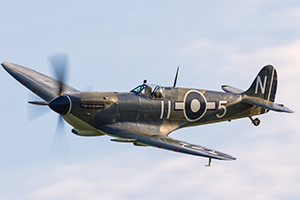 |
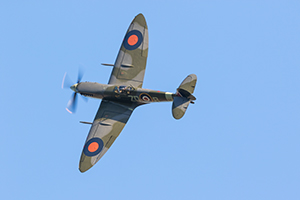 |
||
|
The show closed with a fantastic display of power and speed from The Old Flying Machine Company’s Spitfire Mk IX, MH434. With several high speed ‘beat ups’ of the air field finished with power climbs into a crisp blue sky it really displayed the raw power, engineering magnificence and sheer beauty of Mr R J Mitchell’s timeless design. Once the show had officially finished for the day it was clear everyone present had witnessed an unbelievably great air show. For myself personally it had been one of the best air shows I felt I had attended. One thing was clear, the organisers at IWM Duxfordhad commemorated the 75th Anniversary of the Battle of Britain in style, but the question now stands; how will they ever top this? I would like to dedicate this review to all of the pilots and ground crew who took part in the Battle of Britain 75 years ago so that our way of life, our freedom remained. It is important to remember that it wasn’t just a British Victory, 20% of those young men who climbed into their fighter aircraft up to 4 or 5 times a day were volunteers from parts of Europe ravaged by the war, parts of the British Common Wealth and the United States of America. To the men who Churchill called “The Few”, we will remember you. |
|||
Review
by Jonathan Wintle |
|||


